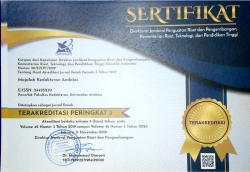Peripartum Cardiomyopathy in Preterm Pregnant Women during the Covid 19 Pandemic
Abstract
Peripartum cardiomyopathy (PPCM) is a life-threatening disease with left ventricular (LV) dysfunction towards the end of pregnancy or in the months following delivery in women previously had no heart disease. Symptoms of heart failure (HF) are the main clinical manifestations of PPCM. Many pregnant women near the end of pregnancy experience shortness of breath, fatigue, swelling of the legs, which are symptoms identical to normal effects found in pregnancy. These symptoms are almost similar to early HF, so they often go unnoticed by medical personnel. Objective: We reported a case of PPCM that occurred during preterm pregnancy. Case: 29 years old woman, 33-34 weeks pregnant with a history of severe preeclampsia. The patient complained worsening shortness of breath for the last 5 days, but suspected that the symptom was just a normal process of growing pregnancy. In echocardiography examination found that the patient had LV dysfunction with low ejection fraction (EF) of 30%. The patient was diagnosed with PPCM in preterm pregnancy. Conclusion: Based on this case report, early identification of PPCM is a good predictor of outcome, because early treatment is given.
Keywords: Peripartum cardiomyopathy; heart failure; pregnancyKeywords
Full Text:
PDFReferences
Arany Z, Elkayam U. Peripartum Cardiomyopathy. Circulation. 2016;133(14):1397-409.
Bauersachs J, Konig T, Meer PVD, et al. Pathophysiology, diagnosis, and management of peripartum cardiomyopathy: a position statement from the Heart Failure Association of the European Society of Cardiology Study Group on peripartum cardiomyopathy. European Journal of Heart Failure. 2019; 21: 827-843.
Hartoyo, Rampengan S, Martha Y, Hariawan H, Nagajiwa B, Karo-karo S. Clinical characteristic of peripartal cardiomyopathy patient in national cardiac centre harapan kita during 2001-2005. 2010
Johnson-Coyle L, Jensen L, Sobey A, American College of Cardiology F, American Heart A. Peripartum cardiomyopathy: review and practice guidelines. Am J Crit Care. 2012;21(2):89-98.
Capriola M. Peripartum cardiomyopathy: a review. Int J Womens Health. 2013; 5:1-8.
Macas A, Rimaitis K, Bakšytė G, Šilinskytė L. Peripartum cardiomyopathy: case report. Acta medica Lituanica. 2012;19.
Karafiatova L, Lazarova M, Taborsky M. Peripartum cardiomyopathy – A case report and concise review. Cor et Vasa. 2017;59(3): e272-e6.
Regitz-Zagrosek V, Roos-Hesselink JW, Bauersachs J, Blomstrom-Lundqvist C, Cifkova R, De Bonis M, et al. 2018 ESC Guidelines for the management of cardiovascular diseases during pregnancy. Eur Heart J. 2018;39(34):3165-241.
Jackson AM, Dalzell JR, Walker NL, Coats CJ, Jhund PS, Petrie MC. Peripartum cardiomyopathy: diagnosis and management. Heart. 2018;104(9):779-86.
Scardovi AB, De Maria R. Peripartum cardiomyopathy: challenges and solutions. Research Reports in Clinical Cardiology. 2017; Volume 8:31-40.
Casu G, Merella P. Diuretic therapy in heart failure—current approaches. Eur Cardiol Rev. 2015;10(1):42-7.
Azibani F, Sliwa K. Peripartum Cardiomyopathy: an Update. Curr Heart Fail Rep. 2018;15(5):297-306.
Mishra V, Mishra N. Devanshi. Peripartum cardiomyopathy. J Assoc Physicians India. 2013;61(4):268-73.
Hilfiker-Kleine D, Bauersachs J, Koenig T. Bromocriptine for the Treatment of Peripartum cardiomyopathy. Cardiac Failure Review. 2018;4(1):1.





















